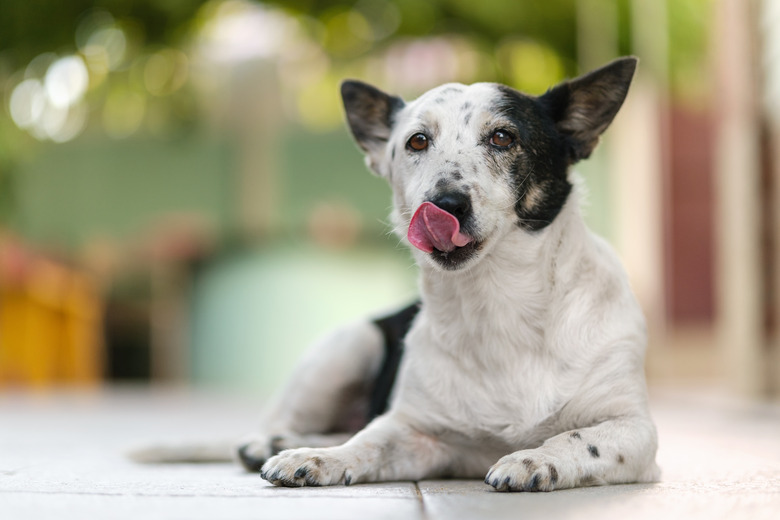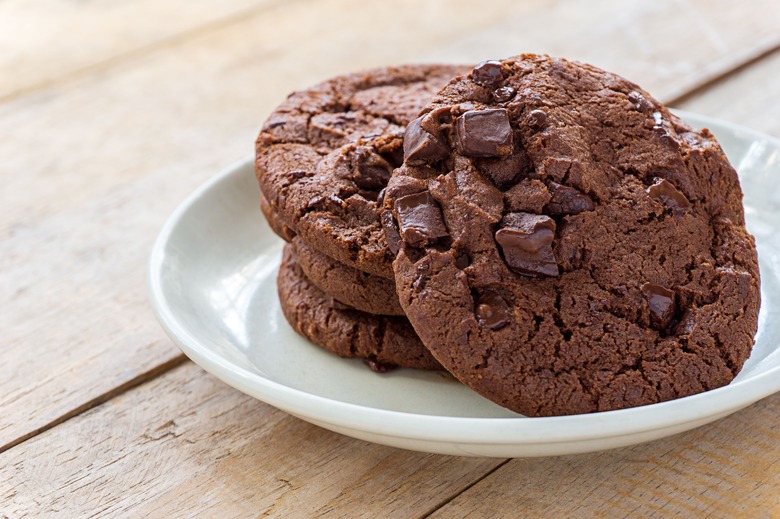Why Can't Dogs Eat Chocolate?
Any dog owner can tell when their dog has eaten something they shouldn't have. Sneaking a mouthful from the cat's litter box, scarfing down a piece of street pizza on a walk — dogs don't exactly have discerning taste. While some forbidden snacks may only cause an upset stomach, chocolate can potentially be fatal if ingested by dogs.
Can dogs eat chocolate?
Can dogs eat chocolate?
No! Dogs can not eat chocolate. If there is one food to avoid giving your dog in any form or amount, it's chocolate. This is because dogs' bodies cannot process two ingredients found in chocolate, caffeine, and theobromine. Even a small amount could make them sick.
How much chocolate is poisonous for dogs?
How much chocolate is poisonous for dogs?
The risk of your dog getting sick from eating chocolate depends on your dog's weight and the type and amount of chocolate consumed. Methylxanthines, the class of chemicals containing caffeine and theobromine, are found in varying amounts in different types of chocolate. Dark chocolate, baker's chocolate, and cocoa powder have the highest amounts of theobromine while milk chocolate has slightly less.
In general, mild symptoms of chocolate toxicity occur when a dog consumes 20 mg of methylxanthines per kilogram of body weight. Cardiac symptoms of chocolate toxicity occur around 40 to 50 mg/kg, and seizures occur at 60 mg/kg and higher. This means that a toxic dose of chocolate is approximately one ounce of milk chocolate per pound of body weight.
Chocolate toxicity calculators are useful for visualizing the relationship between the amount and type of chocolate consumed and your dog's weight — and for knowing when to call the vet. For example, if your 60 pound pup sneaks a crumb of chocolate cake off your plate, you don't need to panic. If your 10 pound dog eats a one ounce chocolate bar, however, it can cause chocolate toxicity.
Why is chocolate toxic to dogs?
Why is chocolate toxic to dogs?
Chocolate is toxic to dogs because of how slowly theobromine is processed by a dog's digestive system. Theobromine inhibits the activation of adenosine receptors, which are responsible for making us feel sleepy. This causes theobromine to act as a stimulant when ingested by dogs.
Theobromine causes an increased heart rate, hyperactivity, vomiting, and diarrhea. At higher doses, theobromine can be fatal for dogs. The symptoms of chocolate toxicity in dogs will vary depending on the dog's weight and how much chocolate was eaten.
Are all types of chocolate equally poisonous to dogs?
Are all types of chocolate equally poisonous to dogs?
Because the amount of theobromine varies between different types of chocolate, some are more dangerous to dogs than others.
Dark, bitter chocolate contains the highest theobromine content. Baking chocolate, cocoa powder, and dark chocolate contain between 130 and 450 mg of theobromine per ounce. Milk chocolate contains between 44 and 58 mg of theobromine per ounce. White chocolate typically does not pose a risk for chocolate poisoning, as it only contains 0.25 mg of theobromine per ounce. However, dogs can still become ill from the fat and sugar in white chocolate. Xylitol, an artificial sweetener, is also toxic to dogs and is a common ingredient in chocolate and candy.
What should I do if my dog eats chocolate?
What should I do if my dog eats chocolate?
If your dog eats chocolate or shows signs of chocolate poisoning, call your veterinarian immediately. If it's after-hours, call the nearest emergency veterinarian. You can also call the pet poison helpline at (855) 764-7661. A veterinary professional can help you determine if your dog ingested a toxic amount of chocolate. They will ask about the weight of your dog, what kind of chocolate was eaten, and how much they have eaten.
You may not know for certain whether your dog ate chocolate. Your dog may have gone counter-surfing while home alone. They might have eaten an unwrapped chocolate and left no wrapper behind as evidence. If your dog is exhibiting any symptoms of chocolate poisoning, call your veterinarian. Or call an emergency veterinarian or the pet poison helpline if it is after-hours — right away.
Clinical signs of chocolate poisoning depend on the amount and type of chocolate ingested. Symptoms include:
- vomiting
- diarrhea
- increased thirst
- panting
- restlessness
- excessive urination
- racing heart rate.
- muscle tremors
- seizures
- heart failure
How is chocolate poisoning treated?
Treatment for chocolate poisoning will vary depending on the individual dog and the type and amount of chocolate ingested. If treated early, veterinarians can induce vomiting and administer activated charcoal to prevent theobromine from being absorbed into the body. Intravenous fluids are commonly used to help hydrate the dog and promote theobromine excretion.
The bottom line
The bottom line
Chocolate is toxic to dogs, even in small amounts. The theobromine and caffeine in chocolate act as a stimulant when ingested by dogs and can cause chocolate poisoning. Prevent your dog from ingesting chocolate by keeping it safely out of reach. If your dog ingests chocolate, call your veterinarian or the pet poison helpline at (855) 764-7661 immediately.



